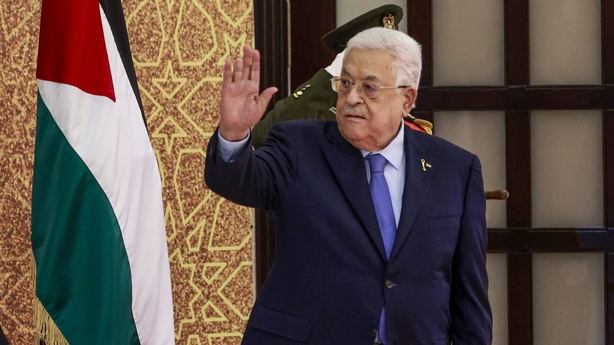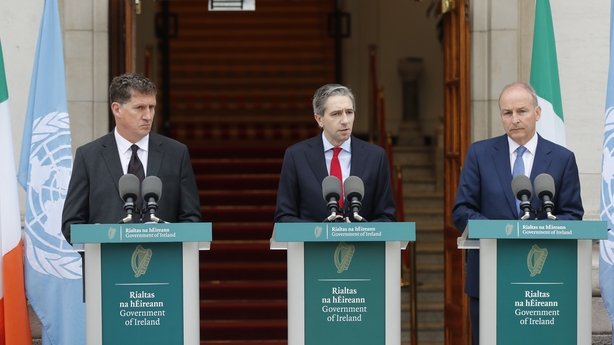Taoiseach Simon Harris has told the President of the Palestinian Authority Mahmoud Abbas that Ireland's recognition of Palestine was to keep the hopes of a two-state solution to the conflict with Israel alive.
Mr Abbas thanked Ireland, Spain and Norway following a joint announcement that a formal recognition would be declared next Tuesday.
Mr Harris told him that Hamas is a brutal terrorist organisation and he utterly condemned the barbaric attack on Israel on 7 October, with Mr Abbas echoing the Taoiseach's statement that Israel had the right to exist in peace and security with its neighbours.
The two spoke about hopes for a lasting ceasefire and an end to the humanitarian catastrophe in Gaza.

In making the announcement this morning Mr Harris, alongside Tánaiste Micheál Martin and Green Party Leader Eamon Ryan, said he was confident other countries would now follow the move in the coming weeks.
"This is an historic and important day for Ireland and for Palestine," he added.
"On January 21 1919, Ireland asked the world to recognise our rights to be an independent state. Our message to the free nations of the world was a plea for international recognition of our independence, emphasising our distinct national identity, our historical struggle, and our rights to self-determination and justice. Today, we use the same language to support the recognition of Palestine as a state."
Speaking on RTÉ's Six One News, Mr Harris stressed that Hamas was not the Palestinian people and the Government's position on Israel or Hamas should not be misrepresented.
"Hamas is not the Palestinian people, and that is a really important point of differentiation. Ireland deplores the actions of Hamas, it is an illegal terrorist organisation, and what they did on 7 October in Israel was an absolute massacre.
"Our position on Israel, our position on Hamas should never be misrepresented. We recognise the state of Israel, its right to exist in peace and security alongside its neighbours."
However, he said this can be done while also understanding there are children in Palestine going to sleep tonight, unsure if they will wake up in the morning.
Countries recognising the existence of the state of Palestine "gives hope" to a two-state solution.
Ireland has always recognised states and not governments, he added.
We need your consent to load this rte-player contentWe use rte-player to manage extra content that can set cookies on your device and collect data about your activity. Please review their details and accept them to load the content.Manage Preferences
"There can be many governments and states around the world where we recognise the state and do not agree with the government, but I find it very hard to understand how you can say you believe in a two-state solution and not at the very least recognise that there are two states.
"That has to be the starting point."
An ambition to recognise Palestinian statehood has been a cornerstone of Irish foreign policy as part of the Government's belief in a two-state solution.
Israel has reacted with fury to the move to recognise Palestine, with the Irish, Spanish and Norwegian ambassadors to Israel to be reprimanded.
Israeli ambassador to Ireland Dana Erlich said Israel is "not denying people the right to self-determination".
Speaking on the same programme, Ms Erlich said Ireland’s recognition of Palestine raised many questions.
"Declaring a state when there are so many questions at stake brings more questions - what is recognised right now? Is it a three-state solution? Because Hamas and the Palestinian Authority do not even talk between themselves."
Ms Erlich said UN criteria for forming and recognising a state dictates that an effective government be in place.
"Which effective government is there right now? There is not," she said, adding "that is why those questions need to be answered before such an announcement is imposed".
She said people can oppose the policies and actions of Israel, but failed to understand how the decision benefited the lives of the Palestinians living in Gaza under Hamas rule.
"When they wake up in the morning, how does this improve their life?" she asked, adding that "internationalising the conflict" does not help them.
Ms Erlich expressed concerns about what she described as "anti-Israeli initiatives" promoted in Ireland, which she said had to be addressed.
"Antisemitism that is on the rise needs to be addressed, needs to be acknowledged. I’m not talking about criticism of Israel I’m talking about antisemitism towards the Israeli community here and the Jewish community," she said.
Ms Erlich feels her time in Ireland was not finished "there is still much more to be done".
The White House said that US President Joe Biden opposes "unilateral recognition" of a Palestinian state, after moves by Ireland, Spain and Norway.
Mr Biden "believes a Palestinian state should be realised through direct negotiations between the parties, not through unilateral recognition," National Security Council spokeswoman Adrienne Watson said.

National Security Council spokesperson Adrienne Watson told RTÉ News: "The President is a strong supporter of a two state solution and has been throughout his career."
In response to the announcements, Israeli Foreign Minister Israel Katz ordered the immediate return of the Israeli ambassadors to the three countries for consultations and warned of further "severe consequences".
"I am sending a clear message today: Israel will not be complacent against those who undermine its sovereignty and endanger its security," he said.
Israel's foreign ministry also said it would reprimand the Irish, Spanish and Norwegian ambassadors in the country and show them a video of female hostages being held in captivity by Hamas.
Most Western governments including the United States say they are willing to one day recognise Palestinian statehood - but not before agreement is reached on thorny issues like its final borders and the status of Jerusalem.
However, Spain's Prime Minister Pedro Sanchez charged that his Israeli counterpart Benjamin Netanyahu's campaign of "pain and destruction" in Gaza was now putting the two-state solution in "danger".
Norwegian Prime Minister Jonas Gahr Store said "recognition of Palestine is a means of supporting the moderate forces which have been losing ground in this protracted and brutal conflict".
"In the midst of a war, with tens of thousands killed and injured, we must keep alive the only alternative that offers a political solution for Israelis and Palestinians alike: Two states, living side by side, in peace and security."
We need your consent to load this rte-player contentWe use rte-player to manage extra content that can set cookies on your device and collect data about your activity. Please review their details and accept them to load the content.Manage Preferences
According to the Palestinian Authority - which rules parts of the occupied West Bank - 142 of the 193 UN member countries already recognise a Palestinian state.
A senior Hamas figure, Bassem Naim, hailed the three European governments for their decisions.
"These successive recognitions are the direct result of this brave resistance and the legendary steadfastness of the Palestinian people," he told AFP.
"We believe this will be a turning point in the international position on the Palestinian issue."
Additional reporting Paul Cunningham

